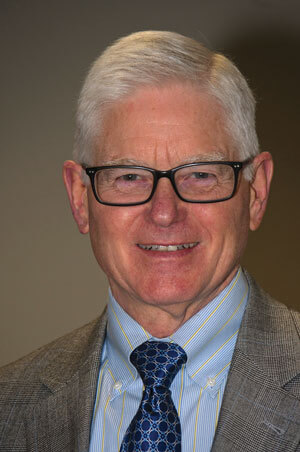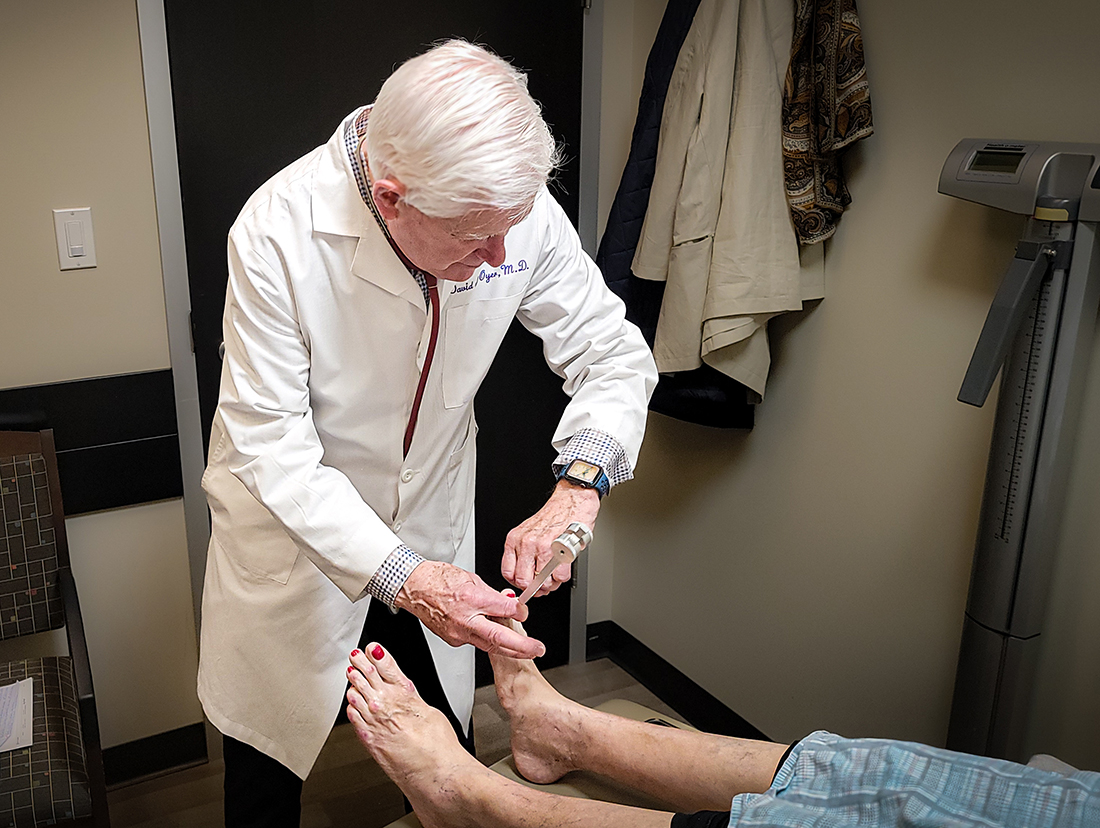Honoring Diabetes Pioneer David S. Oyer
Colleagues, Friends Plan Endowed Professorship to Celebrate Endocrinologist’s 50+ Year Career

For more than 50 years, David S. Oyer, MD, clinical associate professor of Medicine (Endocrinology) at Northwestern University Feinberg School of Medicine, has been a pioneering force of innovative and compassionate patient care in the field of endocrinology.
Today, colleagues and friends of the renowned physician aim to establish the David Smith Oyer Endowed Professorship in Endocrinology. A named and endowed professorship, created in perpetuity, represents the highest honor a university can bestow upon its faculty and help attract and recruit world-class investigators to Northwestern.
Dr. Oyer’s career—during which he developed strong mentor relationships with other influential practitioners, witnessed the advent of revolutionary medical technologies, and treated countless patients with diabetes—showcases the profound impact one person can have in medicine.
In addition to his technical achievements, Dr. Oyer is known for his compassionate bedside manner and dedication to his patients. Inspired by the philosophy that "the secret of caring for the patient is to care for the patient," a quote from the late Francis Weld Peabody, MD, he said he has always prioritized empathy and understanding in his interactions.
“Diabetes is a burdensome condition, and it has been very rewarding to travel on the journey with my patients. I enjoy taking care of their diabetes, and since I also do primary care, taking care of the whole patient,” Dr. Oyer said. “I hope my patients know how much I have cared for them.”
Early Beginnings and Inspiration
Dr. Oyer's journey into medicine and his early career were marked by a series of pivotal moments. Initially, Dr. Oyer did not envision a career in medicine. It wasn't until his junior year at the University of Rochester in New York that he began to consider this path, driven by a growing fascination with the biochemistry of the human body.
At the University of Rochester, Dr. Oyer participated in a summer fellowship at the US Atomic Energy Commission, which was connected to Strong Memorial Hospital. This experience, particularly his work in a chemistry lab on a new assay for calcium, was instrumental in solidifying his decision to pursue a medical career. Looking back, Dr. Oyer recalled with amusement a particularly memorable day in the dog lab. He said he would have fainted—dog labs are a retired practice in research and teaching hospitals—if not for two strong women standing on either side of him.
“I decided that, if I survived that, I can go into the hospital. And, every day, I took a few more steps in, and I didn't die. So, I thought, ‘I think I can do it!’” he quipped.
For most of his post-medical school career, Dr. Oyer has worked with cardiologist Neil Stone, MD, in private practice at Northwestern. Together, they have provided comprehensive care to their patients, leveraging their combined expertise in endocrinology and cardiology since the early 1970s.

“He is simply one of the very best physicians I have ever worked with over my career,” said Dr. Stone, the Robert Bonow, MD, Professor of Cardiology and professor of Epidemiology at Feinberg. “His extraordinary skill in managing patients, especially those with diabetes, his exemplary compassion for his patients, his vision in endorsing new treatments for diabetes years before others accepted them, and his ingenuity in developing a tuning fork test to determine peripheral neuropathy set Dr. Oyer apart from others. It is truly appropriate that there be an endowed professorship in his name honoring his extraordinary career.”
Dr. Oyer emphasized the importance of mentors throughout his distinguished career. While only a first-year medical student at Harvard Medical School, Dr. Oyer met professors Norbert Freinkel, MD, known for his gestational diabetes research and a past president of the American Diabetes Association, and Ronald Arky, MD. Both played a pivotal role in guiding Oyer toward endocrinology, while Oyer was a medical student and years into his career. Dr. Freinkel’s dynamic approach to integrating the chemistry of the body with clinical practice inspired Oyer to pursue both research and patient care.
After two years of medical school, Dr. Oyer took a year off to study the action of insulin on protein synthesis at the University of Chicago. Meanwhile, Dr. Freinkel became chief of Endocrinology at Northwestern and encouraged Dr. Oyer to follow him on endocrine rounds.
“For the next year, I was exposed to brilliant patient care at Wesley, Passavant, and the VA hospital,” Dr. Oyer said. “That was life-changing, because of the inspirational way Dr. Freinkel applied science and chemistry to the clinical situation.”
When he returned to Boston, Dr. Oyer was determined to specialize in endocrinology. In his fourth year of medical school, he took a diabetes elective overseen by Dr. Arky and discovered a passion for foot care for patients with diabetes.
Both Dr. Freinkel and Dr. Arky continued to provide invaluable guidance to Dr. Oyer, whose post-medical school career first took him to Boston City Hospital for residency, then to the National Cancer Institute of the National Institutes of Health (NIH), George Washington Hospital, and Massachusetts General Hospital for fellowship. He then spent formative early-career years at Evanston Hospital and St. Joseph Hospital. Finally, he landed at Northwestern Medicine.
Joseph T. Bass, MD, PhD, chief of Endocrinology and the Charles F. Kettering Professor of Medicine, commended Dr. Oyer for his contributions at Northwestern.
“Dr. Oyer brings unparalleled expertise and a wealth of experience to our endocrinology patients, as well as to our medical students and trainees,” he said. “All of us at Northwestern are incredibly fortunate to count ourselves as colleagues of such a caring and compassionate leader in the field of endocrinology.”
Innovations in Diabetes Care
Dr. Oyer’s career aligned with a revolutionary period in diabetes, and he is credited with researching and advocating for the use of today’s widely adopted endocrine therapies including insulin and GLP-1 agonists.
In the mid-1970s, Dr. Oyer advocated for home glucose monitoring and point-of-care glucose meters, revolutionizing diabetes management by enabling patients to monitor their blood sugar levels more effectively. He also pioneered fine-needle aspiration biopsies for thyroid nodules, improving diagnostic accuracy and reducing unnecessary surgeries. In the early 1980s, he recognized the potential of computers for better data management and analysis in medical settings. By the 1990s, he embraced statin therapy for patients with diabetes and led his clinic in trialing human insulin and related therapies.
In 2005, Dr. Oyer realized that GLP-1 receptor agonist therapy had great potential for patients with type 2 diabetes and encouraged drug companies to home their research into this medication class. Through his advocacy, his clinic became a study site for the Lead 3 trial with liraglutide, a once daily GLP-1 agonist eventually launched as Victoza in 2010. Dr. Oyer served on many advisory panels for liraglutide and helped with the launch.
Noting that many patients were super-responders to lower doses of GLP-1 agonists, he saw the advantage of Novo Nordisk’s pre-filled FlexPen that, when twisted, clicked to signal-defined dosages, allowing users to fine-tune doses of liraglutide and semaglutide. This helps prevent patients from taking higher doses than necessary, avoiding unwanted side effects.
His vocal support for the pen, which allows for dosing by clicks, was influential in persuading the manufacturer to keep the pen instead of switching to a single-dose device. The clicking method drew many advocates, and at Northwestern became known affectionately as the “Oyer Method.”
Clanging Tuning Fork Test

In the mid-2000s, Dr. Oyer discovered that a tuning fork, typically used for hearing and nerve function assessments, could quantitatively measure diabetic peripheral neuropathy by evaluating vibratory sensation in patients' toes. This reproducible and accurate test involves striking the tuning fork to produce a consistent vibration, which the patient reports when they no longer feel it, providing a precise assessment of nerve function.
Dr. Oyer continues to publish research demonstrating the test's reliability, with a standard deviation of about one second, making it particularly effective in identifying patients at risk of foot injuries due to neuropathy. Unlike traditional methods like the monofilament test, which often miss severe nerve damage, the clanging tuning fork test offers a more sensitive measure, enabling early intervention and better diabetic foot care management. By quantifying nerve function, the clanging tuning fork test aids healthcare providers in making informed decisions, preventing complications such as infections and foot ulcers.
Dr. Oyer's development of this test marks a significant advancement in endocrinology and diabetic care, reflecting his commitment to improving diabetes treatment and inspiring future endocrinologists through his efforts to establish a professorship in diabetes care.
“I devoted my life to diabetic patients, and I want good doctors to continue to take care of them,” Dr. Oyer said. “I’m just overwhelmingly grateful for this professorship and hope it will help grow the field of talented endocrinologists.”
For more information about endowed professorships or to make a gift to support the Oyer Professorship, please contact Tiffany Scaparotti at tiffany.scaparotti@northwestern.edu or 312-503-3088.